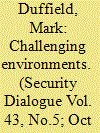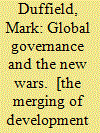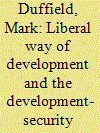|
|
|
Sort Order |
|
|
|
Items / Page
|
|
|
|
|
|
|
| Srl | Item |
| 1 |
ID:
117608


|
|
|
|
|
| Publication |
2012.
|
| Summary/Abstract |
Despite the widespread perception of danger, the aid industry continues to expand within challenging political environments. As a way of reducing risk, this expansion has been accompanied by the 'bunkerization' of international aid workers. While this development is largely viewed by the industry as an unfortunate response to a decline in external security, a more holistic approach is used here to explain the consequent paradox of liberal interventionism: an expansion that is simultaneously a remoteness of international aid workers from the societies in which they operate. The demise of modernist legal, moral and political constraints, together with a decline in the political patronage that aid agencies enjoy, has been important in shaping the new risk terrain. At the same time, these changes embody a profound change in the way contingency is approached. Earlier modernist forms of protection have been replaced by postmodernist calls for resilience and the acceptance of risk as an opportunity for enterprise and reinvention. Within the aid industry, however, field-security training represents a countervailing attempt to govern aid workers through anxiety. Resilience, in the form of 'care of the self' techniques, becomes a therapeutic response to the fears induced in this way. Viewed from this perspective, apart from reducing risk, the bunker has important therapeutic functions in a world that aid workers no longer understand or feel safe in.
|
|
|
|
|
|
|
|
|
|
|
|
|
|
|
|
| 2 |
ID:
077880


|
|
|
|
|
| Publication |
2007.
|
| Summary/Abstract |
As a liberal relation of governance, development has a long genealogy spanning the colonial and postcolonial periods. This article attempts to uncover these interconnections. Development is first examined in terms of its singular ability to constantly reinvent itself as a "new and improved" formula for sharing the world with others. After discussing the relationship between development, liberal imperialism, and racism, decolonization is considered in relation to the emergence of a global biopolitical divide between "developed" and "underdeveloped" population. That is, life supported by social insurance as opposed to life excepted to be self-reliant. As a technology of security, development policies this divide. The article argues that the ability of effective states to declare a humanitarian emergency within ineffective ones has played a central role in the post-Cold War reexpansion of the West's external sovereign frontier. Since humanitarianism ignores the state, however, within liberal strategies of governance, consolidating this frontier has fallen to development. While respect for territorial integrity remains, sovereignty over life within ineffective states is now internationalized, negotiable, and contingent.
|
|
|
|
|
|
|
|
|
|
|
|
|
|
|
|
| 3 |
ID:
067731


|
|
|
|
|
| Publication |
London, Zed Books, 2005.
|
| Description |
x, 293p.
|
| Standard Number |
1856497496
|
|
|
|
|
|
|
|
|
|
|
|
Copies: C:1/I:0,R:0,Q:0
Circulation
| Accession# | Call# | Current Location | Status | Policy | Location |
| 050718 | 303.66/DUF 050718 | Main | On Shelf | General | |
|
|
|
|
| 4 |
ID:
094758


|
|
|
|
|
| Publication |
2010.
|
| Summary/Abstract |
As the rising death toll among humanitarian aid workers suggests, saving strangers has become a dangerous occupation. In addressing the consequences of this increase, this article begins by placing the development-security nexus in its historical context. While it has long been associated with liberalism, two factors distinguish this nexus today: first, the global outlawing of spontaneous or undocumented migration; second, the shift in the focus of security from states to the people living within them. Reflecting these moves, policy discourse now conceives development and underdevelopment biopolitically - that is, in terms of how life is to be supported and maintained, and how people are expected to live, rather than according to economic and state-based models. The household and communal self-reliance that forms the basis of this biopolitics, however, has long been in crisis. Since the end of the Cold War, the destabilizing forms of global circulation associated with this emergency have been reconstituted as threats to the critical infrastructures that support mass consumer society. A new security terrain now links the crisis of adaptive self-reliance with risks to critical infrastructure within a single framework of strategic calculation. Rather than ameliorating the generic life-chance divide between the global north and south, the development-security nexus is entrenching it.
|
|
|
|
|
|
|
|
|
|
|
|
|
|
|
|
| 5 |
ID:
070957


|
|
|
|
|
| Publication |
2006.
|
| Summary/Abstract |
Human security is commonly understood as prioritizing the security of people, especially their welfare and well-being, rather than that of states.1 Rather than examining human security as a measurable or specific condition, however, the focus here is how ideas of human security facilitate the way that Southern populations are understood, differentiated and acted upon by Northern institutions. Of special interest is how human security as a relation of governance has continued to evolve within the war on terrorism. This is explored, among other things, through interviews with a number of British-based NGOs and the Department for International Development. At the close of the 1990s, human security encapsulated a vision of integrating existing aid networks into a coordinated, global system of international intervention able to complement the efforts of ineffective states in securing their citizens. Compared to this more universalistic and Southern-oriented notion of human security, which had a place for independent aid agencies, the war on terrorism is refocusing developmental resources on those sub-populations, regions and issues regarded as important for homeland security
|
|
|
|
|
|
|
|
|
|
|
|
|
|
|
|
|
|
|
|
|